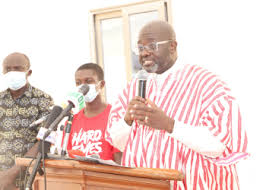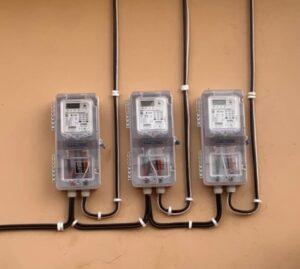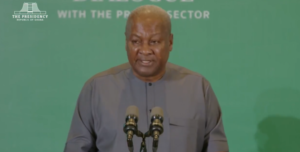Story: Atta Kwaku Boadi
The Progressive People’s Party (PPP) has laid down a clear marker for the Mahama Administration, declaring that without immediate democratic governance reforms—specifically the election of Metropolitan, Municipal, and District Chief Executives (MMDCEs)—the 2026 Budget’s goals will remain fundamentally unattainable.
While the PPP supports the budget’s focus on job creation and the local economy, the party’s statement signed by National Chairman Nana Ofori Owusu, and copied to the media, emphatically stated that the current centralised political structure and an unreformed public service were the “critical gaps” that must be addressed.
The central pillar of the PPP’s critique was the current system of appointing MMDCEs, which it argued weakens accountability and dampens local economic development.
“Meaningful fiscal and decision-making decentralization would strengthen the ability to make change happen countrywide. The public service must be reset. Otherwise, the implementation of the important policy initiatives will fall short of the intended goals,” the statement stated.
The PPP in the statement demanded that the government elects MMDCEs immediately to ensure local government leaders were directly answerable to the citizens they serve, rather than the central government that appointed them.
Beyond MMDCE elections, the party called for a broader governance overhaul targeting waste and inefficiency
Read PPP’s Full Statement
POSITION ON THE 2026 BUDGET STATEMENT AND GOVERNMENT PROGRAMME
1.Introduction
The Progressive People’s Party (PPP) has carefully reviewed the 2026 Budget Statement presented under the theme “Resetting for Growth, Jobs, and Economic Transformation.” As a party committed to transparent governance, decentralised administration, and a production-driven national economy, we present this Position Paper to assess the substance, gaps, and national implications of the government’s programme against the PPP’s Agenda for Change.
We acknowledge the fact that the 2026 Budget signals a renewed attempt by government to stabilise macroeconomic indicators and restore national confidence. It stands as a good effort. But in our opinion, it falls short of the deep structural reforms required for sustainable transformation. For instance, the public service which the Mahama Administration will rely for implementation remains largely unchanged. The public sector must be reset. Otherwise, the implementation of the important policy initiatives will fall short of the intended goals.
2. General Observations
The 2026 Budget outlines investments in agriculture, infrastructure, manufacturing, and social services. The PPP acknowledges these intentions, but stresses that without democratic governance reforms and modernised public administration, implementation will remain weak. Meaningful fiscal and decision-making decentralization would strengthen the ability to make change happen countrywide.
3. Points of Alignment with the PPP Agenda for Change
3.1 Fiscal Discipline
The PPP welcomes the Budget’s emphasis on fiscal discipline, reduced waste, and integrity in public financial management. We note though that this needs a reformed public sector and a willingness to crack the whip on those who refuse to act with discipline.
3.2 Job Creation & Productive Sector Focus
Initiatives such as the 24-Hour Economy, Big Push Infrastructure Programme, agricultural mechanisation, and export expansion align with PPP’s job creation philosophy. We need a declaration from the Mahama Administration not to repeat the disastrous collapse of indigenous businesses as experienced under the Akufo- Addo administration.
3.3 Social Sector Commitment
Investments in teacher development, educational infrastructure, and the Ghana Medical Trust Fund align with PPP’s emphasis on compulsory high-quality education and accessible healthcare.
3.4 Local Industry Empowerment
The focus on domestic manufacturing, agriculture, and value addition aligns with the PPP’s goal of Ghana becoming a producing nation.
4. Acknowledgment of Road and Infrastructure Commitments
The PPP notes the government’s planned rehabilitation of highways, upgrading of regional and urban roads, feeder road enhancements, bridge modernisation, and rural connectivity improvements. Roads underpin trade, agriculture, tourism, and national cohesion.
5. Acknowledgment of Capital Injection Programmes
The PPP recognises government’s intention to inject capital into the economy through Development Bank Ghana, agricultural funding, special industrial credit schemes, and liquidity support for productive industries.
6. Acknowledgment of Directive for Public Institutions to Buy Locally Produced Food
The PPP acknowledges President Mahama’s directive for all public institutions to purchase locally produced food. This will:
- Boost local farmers
- Strengthen Ghana’s food systems
- Reduce the import bill and protect the cedi
- Create agricultural and value-chain jobs
- Improve national food security
The PPP emphasises the need for transparent procurement, timely payments, and strict monitoring to ensure impactful implementation.
Our questions, why stop at educational institutions? The PPP insists that not one pesewa of Ghanaian tax money should be spent to purchase anything imported especially food, drinks, services and anything Ghanaians can produce.
7. Critical Gaps Identified by the PPP
- No provision for elected MMDCEs
- Lack of comprehensive public sector reform
- Weak PPP (public–private partnership) strategy
- Insufficient SME development support
- No enforcement of compulsory basic-to-SHS education
- Value-for-money risks in large-scale projects
8. OUR Official Position on the 2026 Budget
The PPP:
- Supports the productive-sector focus, capital injection programmes, and local food procurement directive.
- Welcomes road and infrastructure rehabilitation efforts, subject to strict auditing.
- Expresses disappointment at the absence of democratic governance reforms.
- Calls for deeper civil service restructuring.
- Demands an independent value-for-money office.
- Encourages a strong national PPP financing framework.
9. OUR Recommendations
- Elect MMDCEs immediately
- Establish a National SME Acceleration Programme
- Enforce compulsory basic-to-SHS education
- Introduce civil service performance contracts
- Create an Independent Value-for-Money Office
- Adopt a national PPP financing framework
- Let all government agencies Buy goods and services produced locally
10. Conclusion
We acknowledge the government’s efforts but stresses that without deep governance reforms, decentralised accountability, SME expansion, civil service restructuring,
compulsory education enforcement, and full private-sector mobilisation, Ghana risks repeating cycles of temporary recovery instead of achieving lasting transformation.
SGD
Nana Ofori Owusu
National Chairman





